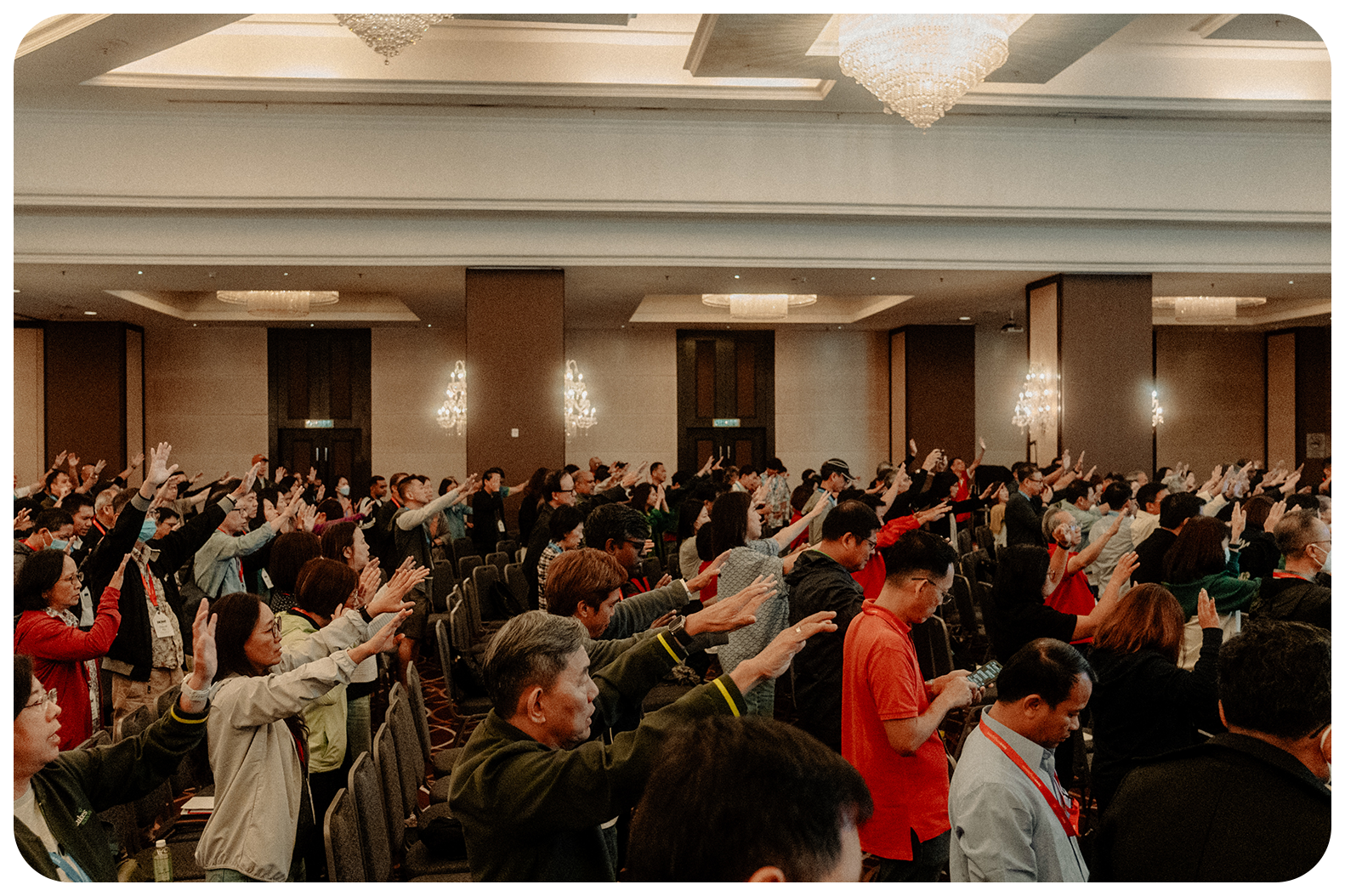The life cycle of an organisation can be described as a curve. It starts with a new mission, picks up momentum, and eventually reaches a point of movement at its peak.
At this peak of influence, the company or movement doesn’t even need to sell itself. It has become so popular that it feels unstoppable.
However, at this point, the movement becomes so big that you need to start institutionalising it. You have to put in rules and structures so that it can function properly.
So it slowly becomes a machine. It is no longer running on new impetus or fresh ideas, but simply operating on autopilot. This is also where it starts to lose momentum.
At this point, if you don’t arrest the slide and pick up the momentum, the organisation will continue to go down and become a monument.
So how do we ensure that this doesn’t happen to the church?
We need to arrest the slide by jumping the S-curve, again and again. Starting to change only when the curve starts to flatten is way too late. We need to make sure that the trajectory of the chart doesn’t go down.
And that means innovation. Fresh products. Change.
This is God’s will for our youth. “Winning The Youth” is a message of hope because we are going to do something to jump the S-curve, and we have the Holy Spirit on our side.

The FOPx Research 2023 Report tells us where our youth ministry is on the life cycle. The findings show that:
- Youth leaders and pastors are finding it difficult to manage commitments and boundaries. Many are driven by the guilt of not doing enough.
- Youth leaders and pastors feel that their personal support network in church is insufficient.
- Youth leaders and pastors hope for “safe spaces to make mistakes, learn and grow”. But senior pastors have different sentiments.
- “Effective mentorship of Youth Leaders through intergenerational support network” came up as the top voted need in developing a new generation of youth leaders.
- Youth leaders and pastors feel most challenged by the “increasingly secularised society with polarising worldviews”, the “more individualised and sceptical mindsets of the youth”, and the “negative influence of social media”.
Why do we need to talk about the state of the church? Because if we bring new people into an unhealthy church, no one will stay.
But if the church is healthy and vibrant, the youth themselves will advertise for the church. They would want to bring their friends to church.
More than looking inward, we need to look outward.
To win the youth, we need to know the youth. We need to know what the youth out there are looking for, and help them to see how the church can offer answers to these questions.
Here are 4 Rs that I think all youths are looking for and how the church can come into the picture.
1. Reason to live
The youth today have moved up in the Maslow’s Hierarchy of Needs. Their basic needs have already been provided for and they are no longer just thinking about survival.
They are beginning to question the purpose of life: “Why am I here? Why do I keep going on with life?”
“Working hard” and “studying hard” are no longer sufficient reasons for them to just go on with life.
Youth today don’t realise that this search for meaning is a God-shaped hole in their hearts (Ecclesiastes 3:11). And they try to fill it with everything else in the world.
The church should: Evangelise and elevate
The Great Commission is the reason to live. Instead of just searching inward and feeling lost and miserable, we need to elevate the youth to look outward.
They are given a reason to live. They are here to tell people that there is hope, there is a future, there is a destiny. They are here so that they can tell people about the Good News.
The youth know best the fallenness of this world and the fallenness of man. What they need is the answer – the Good News.

2. Reality of God
A global Barna study suggests that the majority of young adults in Singapore still believe in the spiritual. Only 3% of local respondents polled did not believe that spiritual forces exist.
In fact, the majority of respondents (82%) were either “certain” that spiritual forces exist (43%) or “think they exist” (39%).
The numbers here are much bigger than the percentage of Christians in Singapore. Religion is definitely still relevant to the youth. Many of them still feel that there is something beyond what we experience in the here and now.
The church should: Exemplify and excite
The church must be able to convey and manifest the reality of God. When people come into the presence of Christians, they must realise that there is a real God who can meet their needs and a real community that can answer their questions. They must be able to find the answer to the God-shaped hole in their hearts.
We need to exemplify and excite what being loved by God means. We need to show them what God’s love is like.

If we don’t love the youth like God does, the youth would think: “If this is the reality of the God you worship, I don’t want any part of it”.
The church needs to learn to get into their culture and excite them about the reality of God.
Otherwise, why would they want to go into a church when it’s even less exciting than the misery they’re facing out there?
We need to show the youth that the church is really a better place to be in.
3. Respite from life
Life isn’t easy for the youth. The school system is harder and more competitive, their examination standards are brought up to match the international standards, many are starting to deal with mental health issues…
Some of us might think that this is just their perspective. But we need to know that their perspective is their reality.
A BBC article indicates that “Gen Zs are emerging as the most stressed demographic in the workplace, and struggling mightily to cope. The same data shows un-manageable stress affects almost a quarter of the Gen Z respondents (23%), and almost all (98%) are dealing with symptoms of burnout.”
Life is not pleasant for our youth.
The church should: Empathise and equip
The church needs to empathise with the youth and understand their struggles. We need to be there for them. We cannot just brush them off when they talk about their struggles. We need to understand where they are so that we can point them to the light of Jesus.
Once we have earned their trust and shown them that we genuinely care for them, we can equip them with life skills. We can mentor them and guide them. We can run the race with them.
For the youth out there who are looking for respite from life, the church can be a safe haven, a safe place, a safe community.

4. Relationship and connection
Youths are looking for authentic relationships. They would feel turned off by the church when they feel that we are not authentic and we approach them with ulterior motives.
But they would want to be here if it feels real. They would want to be here because they know that they are loved and appreciated, and they cannot find such relationships outside of the church.
The church should: Engage and embrace
As a church, we need to be the first ones to offer words of encouragement, words of sympathy and words of understanding to the youths.
Even if we don’t know how to respond to them, invite them for a meal and hear them out. There is power in simply listening.
We might not agree with their views, but their views are real to them. So we need to hear them out.
Hear them out so that you can win their hearts. Hear them out so that they will be at the table when you share the Gospel. Hear them out so that you can speak into their lives.
So what can we do in response to these? Here’s the ABC to winning the youth:
- All of the above to win hearts and souls. Walk the talk because youth hate a hypocrite.
- Back it up with resources, youth ministry hiring headcount and church calendar.
- Champions in the midst. Empower those who have chemistry with the youth to reach the youth.
To win the youth, we must do whatever it takes, with whatever we have, through whoever He sends.
Trying has no guarantee – but we must at least try!
That’s all on “Winning The Youth”! In the next article from our ongoing Summit 2024 series, you’ll learn about Pastor BENNY HO’s eight best practices to keep ministry fresh. Stay tuned!









